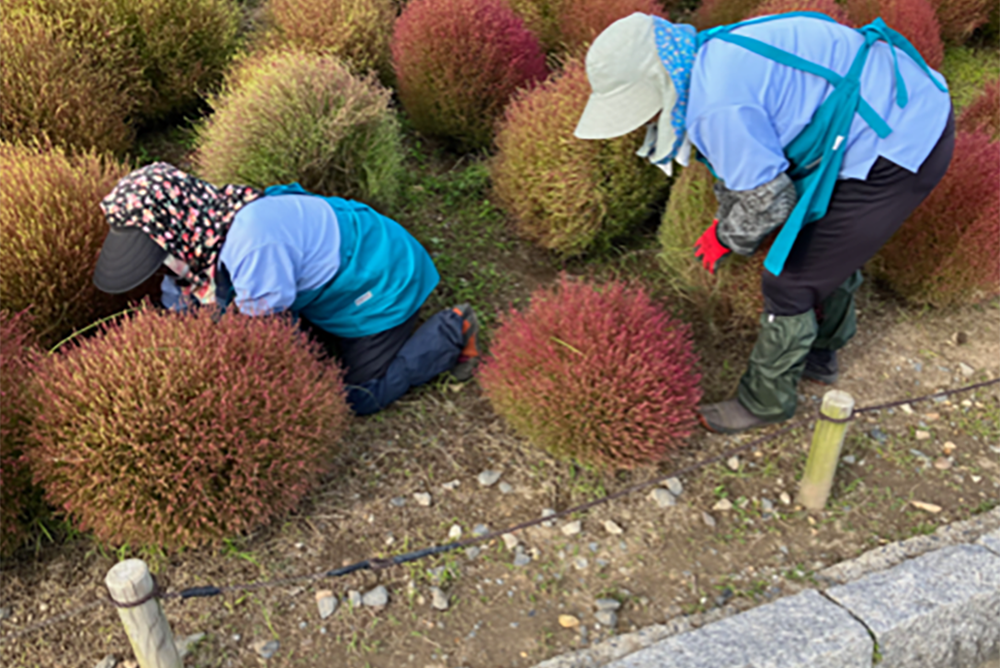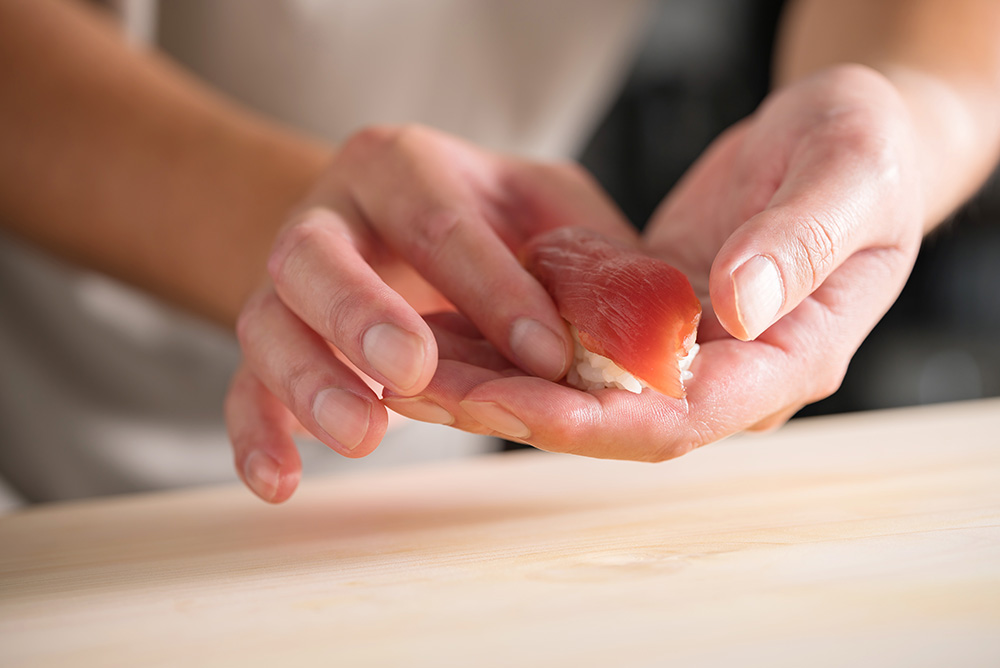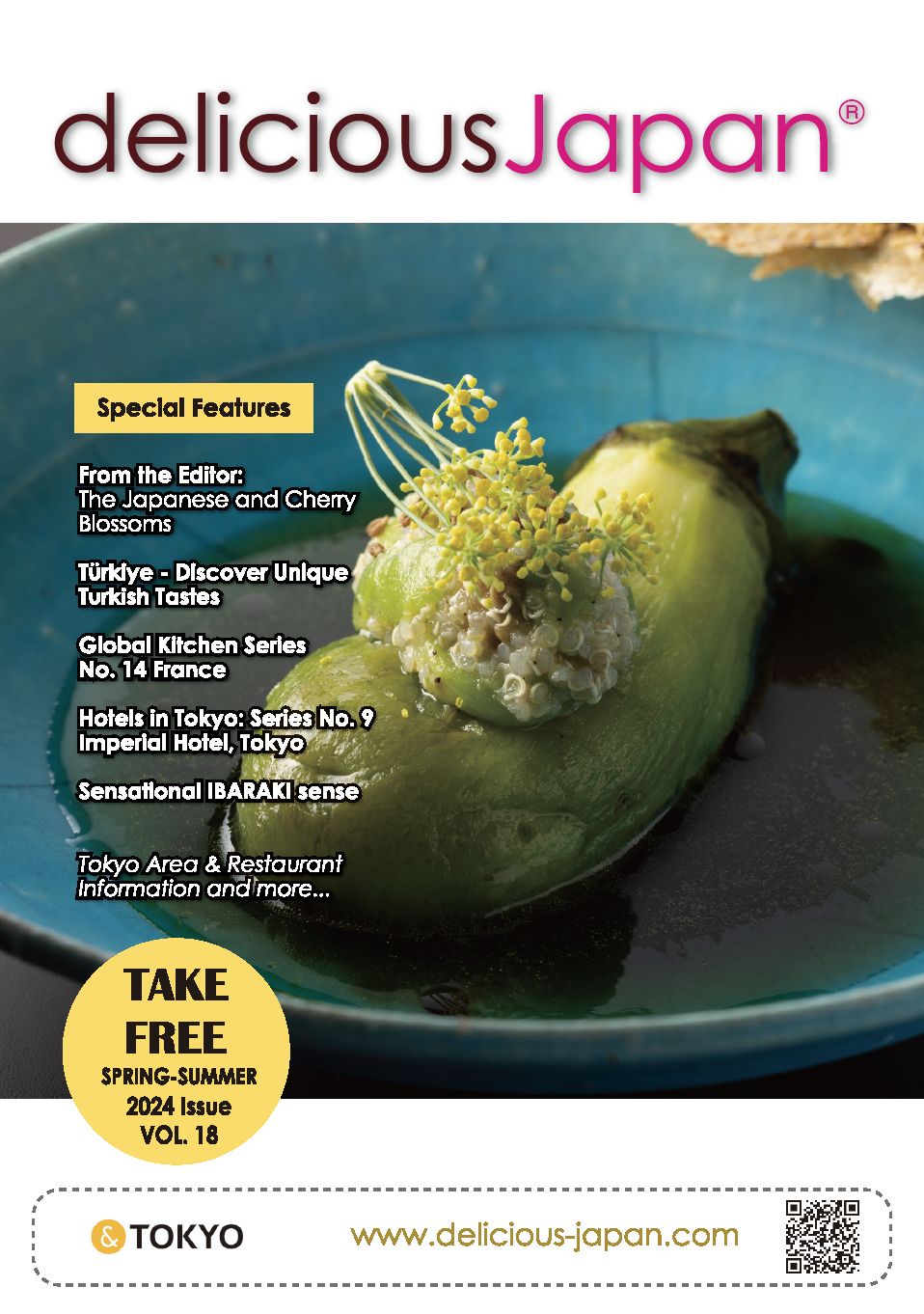
Typical breakfast in Jordan © Baraka Destinations
Global Kitchen Series No. 15 - Jordan

Lina Annab
Ambassador Extraordinary and Plenipotentiary of the Hashemite Kingdom of Jordan
What motivated you to transition from the private sector to a government agency?
I started my career in the private sector where I was fortunate to gain valuable experience and insights that have shaped my professional journey and outlook. However, I always felt a deep-seated desire to give back to society and to my beloved country Jordan within a larger framework. The opportunity to transition into public service, presented itself as a serendipitous fulfilment of this desire.
Can you tell us about your country and its relationship with Japan?
Jordan is a place where history, culture, and natural beauty blend in a unique and stunning way. Officially known as the Hashemite Kingdom of Jordan, it sits at the crossroads of Asia, Africa, and Europe, making it a country with deep historical and heritage roots.
For thousands of years, great civilizations have descended on Jordan, including the Nabateans, Romans, Byzantines, Umayyads, and others. It’s home to magnificent ancient cities like Petra, and it's rich with important religious Moslem and biblical Christian sites. Perhaps not many people know this, but Christianity actually has its beginnings in Jordan, with the baptism of Jesus Christ by John the Baptist in the Jordan River.
If you visit the capital, Amman, you’ll see how the old and the new blend so seamlessly. It's a city where tradition and modern life coexist beautifully. And when it comes to landscapes, Jordan’s natural beauty is diverse—whether it’s the sweeping deserts of Wadi Rum, the fertile Jordan Valley, or the breathtaking Dead Sea, which we describe as the lowest SPA on earth given it is the lowest point on Earth with abundance of oxygen (430 meters below sea level).
What makes Jordan stand out even more is the warmth and generosity of its people. We’re mindful of our reputation for authentic hospitality, and we’ve long been recognized as a country that maintains peace and stability, even in a region rife with conflict. Our commitment to interfaith dialogue is strong, and we’ve opened our doors to refugees from neighboring countries mostly from Palestine and Syria, always driven by our values of compassion and humanity.
This year, 2024, is particularly special for Jordan as we celebrate 70 years of diplomatic relations with Japan. Over the decades, our countries have worked together in many areas such as economic development, education, tourism, and culture. This milestone is a wonderful opportunity to deepen our bonds, which are made stronger by the long-standing friendship between Jordan’s royal family and Japan’s imperial family.
Please tell us about your "Amazing Embassy Cooking" on YouTube.
Filming these videos was a lot of fun, and through them, we aimed to present a piece of Jordan’s culture by curating simple but deeply rooted dishes in our cuisine. I find food to be a powerful tool for introducing Jordan and sharing its rich history. For example, we filmed baking bread and cooking hummus, a dish made from chickpeas and sesame paste drizzled with olive oil. This humble dish carries a complex story that traces back to ancient societies in the Jordan Valley, where advanced food production techniques were developed. Archaeological finds in Jordan reveal that almost 3000 years ago, our ancestors cultivated multiple varieties of wheat, sesame, barley, lentils, chickpeas, green peas, and various herbs like cumin, and coriander. Olive trees existed in the valley 6,000 years ago, and by 4,000 BC, the people of Jawa in north-eastern Jordan were proficient in food processing and water harvesting evidenced by the oldest dam known to mankind; and most recently it is believed that the oldest piece of bread was discovered there as well. It is fascinating to realize that today we are eating what our ancestors ate thousands of years ago, and how these ancient ingredients and techniques remain central to Jordanian cuisine.
Can you outline the differences in food culture between Japan and Jordan?
The food cultures of Jordan and Japan are shaped by their unique histories, geographies, and natural diversities. Both cuisines are seasonal, regional and ceremonial in nature. One key difference, though, is that while Japanese cuisine tends to highlight subtle, delicate flavors, Jordanian food leans into bold, aromatic herbs and spices.
That said, both traditions share some beautiful similarities. They emphasize gratitude, hospitali- ty—what the Japanese call "omotenashi"—and a deep respect for food, with a "no waste" approach. In Japan, they call it “mottainai,” but the idea of honoring what we eat and not wasting is something both cultures hold dear. It’s a reflection of shared values through food.

Mansaf – Jordan's national dish, inscribed on UNESCO's Intangible Cultural Heritage List.
What traditional Arab dishes are popular in Jordan? Can they be recreated deliciously at home?
One of the most beloved dishes in Jordan has to be Mansaf, our national dish. Just like Japan’s washoku, Mansaf is inscribed on UNESCO’s Intangible Cultural Heritage List. It's a hearty dish made with lamb cooked in a rich yogurt sauce made from Jameed—fermented, dried yogurt—and served over rice or bulgur on a layer of thin bread called Shraak.
But Mansaf is just the beginning. Olives and olive oil are staples in Jordanian cooking, and dishes like hummus, mutabbal (eggplant dip), and falafel are also favorites. The list of delicious dishes goes on and on! And while recreating these at home is totally doable, you might need to find substitutes for few ingredients.
I understand that you were assigned to Japan in June 2019. What was your most memorable food experience in Japan?
My most memorable food experience in Japan was not centered around a specific dish or meal, but rather in discovering the essence of Japanese cuisine itself.
In Japan, culinary culture is not merely about cooking; it encompasses everything related to eating and serving food as well. This is based on a profound respect for nature, which is evident in the way food is prepared and presented, with a deep connection to the land and its seasonal bounty.
By exploring the deep-rooted culinary traditions and appreciating the seasonal variations in Japanese food, I have gained a richer understanding of the Japanese culture, which continues to intrigue and inspire me.
What is your favorite Japanese dish?
My favorite Japanese food is sushi and sashimi, especially because of the seasonal variety and freshness. Coming from Jordan, an almost landlocked country and where seafood is rarely served, I was fascinated by the abundance and seasonality of fish with the countless vareities. In winter, I look forward to ankimo, the rich monkfish liver delicacy.
Beyond specific dishes, I’m particularly drawn to kaiseki dinners, which embody the essence of washoku, Japan’s traditional cuisine. The rich variety of carefully balanced and curated dishes in a kaiseki meal creates an unforgettable dining experience. Each dish offers a unique flavor, yet maintains perfect harmony with the others.
Last October, the Ibaraki Prefectural Government signed a partnership agreement with the Jordan Trail Association to promote the trail jointly. Please tell us about that initiative.
The Jordan Trail, a 650-kilometer hiking route showcasing Jordan’s diverse landscapes and rich cultural heritage, is a world-renowned attraction for local and international visitors. Last October, the Jordan Trail Association signed a friendship agreement with Ibaraki Prefectural Government, establishing direct collaboration between Ibaraki’s “Hitachi no Kuni” Trail and the Jordan Trail. This initiative strengthens cultural and adventure tourism ties and fosters deeper people-to-people relations between Jordan and Japan by increasing visitations and exchanging expertise in trail management, eco-tourism, and sustainable tourism practices.
Through hiking the Hitachi no Kuni Trail, I discovered the beauty of Ibaraki’s rich and abundant nature, and was inspired by the prefecture’s satoyama culture, which emphasizes harmony between people and nature. I hope Japanese visitors can similarly connect with Jordan’s landscapes and local communities through hiking and experiencing The Jordan Trail.
Link to recipes of Jordanian food - "Oishi Jordan"





